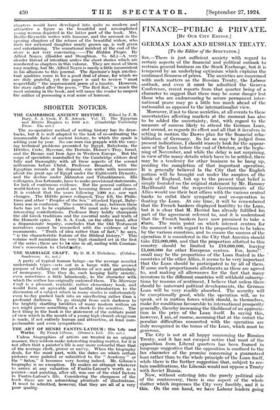SHORTER NOTICES.
THE CAMBRIDGE ANCIENT HISTORY. Edited by J. B. Bury, S. A. Cook, F. E. Adcock. Vol. 'II. The Egyptian and Hittite Empires to 1000 B.C. (Cambridge University Press. 35s. net.) The co-operative method of writing history has its draw- backs, but it is well adapted to the task of co-ordinating the innumerable facts of ancient history, to which the spade is adding year by year. •No one man can grapple with the vary- ing technical problems presented by Egypt, Babylonia, the Hittites, Crete, Mycenae, the Dorians, Homer's Troy, Israel, and the Bronze and Iron Ages in Western Europe. But the corps of specialists marshalled by the Cambridge editors deal fully and thoroughly with all these aspects of the second millennium before Christ. Professor Breasted, with the. Egyptian records at his disposal, can write with 'assurance about the great age of Egypt under the Eighteenth Dynasty, and the decline under Akhnaton and Tutankhamen. His colleagues, less fortunate, have to make provisionalstatements, for lack of continuous evidence. But the general outlines of world-history in the period are becoming firmer and clearer. It is evident that the years following 1200 B.C. saw -vast changes. The Hittite power collapsed;firoy fell, the Philis- tines and other " Peoples of the Sea " attacked Egypt, Baby- lonia was in confusion. The connexion, if any, between these facts has yet to be explained. We must note two specially interesting contributions. Professor Bury boldly champions the old Greek traditions and the essential unity and truth of the Homeric epics. Dr. S. A. Cook, on the other hand, after a dispassionate inquiry, concludes that the Old Testament narratives cannot be reconciled with the evidence of the monuments. " Truth of idea rather than of fact," he. says, " is the characteristic feature of the Biblical history." This volume well maintains the very high standard set in the first of the series ; there are to be nine in all, ending with Constan- tine's conversion to Christianity.






































 Previous page
Previous page